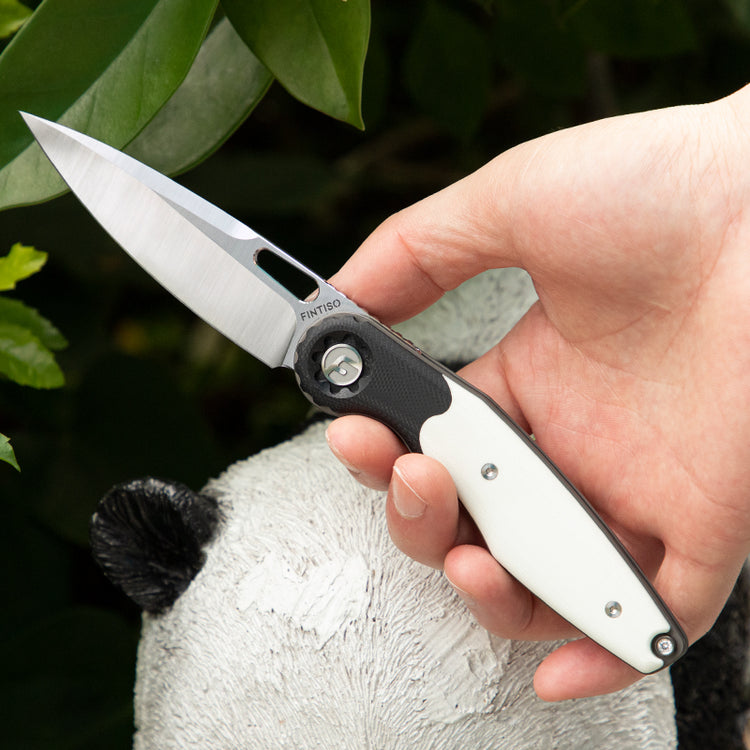1. Introduction
Choosing the right EDC (Everyday Carry) knife is crucial for anyone who values preparedness and utility in their daily life. Whether you're searching for the best pocket knife, EDC knife, or folding knife, it's essential to ensure your choice is not only practical but also compliant with U.S. laws. In this guide, we'll walk you through the key factors to consider when selecting your best EDC knife, with a focus on legality and functionality.

2. Understanding EDC Knives
EDC knives, or Everyday Carry knives, are designed to be versatile tools that you can carry with you wherever you go. They are typically small, portable, and equipped with features that make them useful for a variety of tasks. The best EDC knives are those that strike a balance between size, durability, and ease of use.
There are several types of EDC knives to consider:
- Pocket Knives: Compact and often foldable, these knives are designed to fit easily in your pocket, making them ideal for everyday carry.
- Folding Knives: These knives feature a blade that folds into the handle, offering safety and portability. They are a popular choice for EDC due to their convenience and variety of designs.
- Fixed Blade Knives: Though less common for EDC due to their larger size, fixed blade knives are robust and can be more reliable for heavy-duty tasks.
When choosing your best EDC knife, it's important to consider what you'll be using it for, as different tasks may require different types of blades and features.
3. Key Legal Considerations in the U.S.
Before purchasing an EDC knife, it's crucial to understand the legal landscape in the U.S. Knife laws vary significantly from state to state, and even from city to city, making it essential to stay informed about the regulations that apply to you.
-
Federal Knife Laws: On a federal level, certain types of knives, such as switchblades and automatic knives, are regulated under the Federal Switchblade Act. It's illegal to transport these types of knives across state lines unless you're a member of the military or law enforcement.
For more information on federal regulations, refer to Knife Rights and other legal resources.
-
State and Local Knife Laws: Each state has its own set of knife laws, and they can differ widely. For example, California has strict regulations on blade length, limiting most knives to a maximum of 2 inches in certain locations, while Texas allows for larger knives as long as they are not carried in restricted areas.
It's advisable to check local ordinances using resources like State Knife Laws before carrying your knife.
-
Blade Length Restrictions: Many states impose blade length restrictions, typically around 3 to 4 inches, for knives carried in public. Ensuring your EDC knife complies with these restrictions is crucial to avoid legal issues.
-
Knife Carrying Laws: Whether a knife can be carried openly or concealed varies by state. Some states require that knives be visible when carried, while others have strict rules against concealed carry without a permit.
A comprehensive overview of carrying laws can be found on YouTube channels dedicated to EDC and self-defense.
-
Restricted Locations: Even if your knife is legal to carry, certain locations, such as schools, government buildings, and airports, have strict prohibitions against knives. It's important to be aware of these restrictions to avoid penalties.

4. Factors to Consider When Choosing a Legal EDC Knife
When selecting your best EDC knife, especially within the constraints of U.S. legal guidelines, there are several key factors to consider:
-
Blade Material and Design: The material of the blade significantly impacts its durability and functionality. Stainless steel is a popular choice for its corrosion resistance, while carbon steel is favored for its sharpness and ease of sharpening. The design, such as a drop point or clip point blade, should match your intended use, whether for everyday tasks or outdoor activities.
-
Size and Portability: A good EDC knife should be compact and lightweight enough to carry comfortably. However, it must also comply with legal size restrictions. Look for folding knives with a blade length that falls within the legal limits of your state.
-
Handle Design and Ergonomics: The handle of your EDC knife should offer a secure grip and be comfortable to use over extended periods. Materials like G-10, titanium, or wood are common for their durability and tactile feel.
-
Locking Mechanism: A reliable locking mechanism is essential for safety, especially in a folding knife. Liner locks, frame locks, and lockback designs are popular choices. Ensure the mechanism is easy to operate and complies with your state's regulations.
-
Ease of Maintenance: Choose a knife that is easy to maintain. Stainless steel blades are often easier to care for, requiring less frequent sharpening and being less prone to rust.
5. Popular EDC Knife Brands and Models Compliant with U.S. Laws
When searching for the best pocket knife or EDC knife, it's helpful to start with reputable brands known for their quality and legal compliance. Some of the top brands to consider include:
-
Fintiso: Known for its innovative designs and attention to legal details, Fintiso offers a range of EDC knives that are both functional and compliant with U.S. regulations. Models like the Fintiso Folding Knife are popular choices for everyday carry.
-
Benchmade: A well-respected brand in the EDC community, Benchmade offers a variety of knives that cater to different needs and legal requirements. Their Mini Griptilian is a versatile option that adheres to many state laws.
-
Spyderco: Spyderco is famous for its unique blade designs and ergonomic handles. The Spyderco Delica 4 is a compact folding knife that is well-suited for EDC while complying with most legal restrictions.
For more recommendations and reviews, check out YouTube EDC knife reviews.
7. Common Legal Myths and Misconceptions
There are several myths and misconceptions surrounding EDC knives and their legality in the U.S. It's important to separate fact from fiction to avoid unintentionally breaking the law.
-
Myth: All small knives are legal to carry.
- Fact: Even small knives can be illegal in certain jurisdictions, especially if they have features like automatic opening or if they exceed local blade length limits.
-
Myth: You can carry any knife if you use it for work.
- Fact: Employment-related use does not necessarily exempt you from local laws. It's essential to check specific legal allowances for occupational knife use.
-
Myth: Knife laws are the same across all states.
- Fact: Knife laws vary widely by state and even by city. Always research local regulations before carrying your EDC knife.
For a deeper dive into legal myths, watch this informative YouTube video on knife law myths.
8. Conclusion
Choosing the best EDC knife involves more than just finding a tool that fits your needs; it also requires ensuring your choice is legally compliant. By understanding the types of EDC knives available, the legal considerations in the U.S., and the key factors to consider when making your selection, you can confidently choose a knife that is both practical and legal. Remember to stay informed about changes in laws and consult reliable resources to avoid any legal pitfalls.

